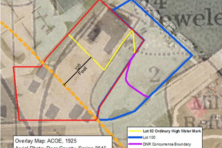DNR Ramping Up Efforts to Address Kewaunee County Water Issues
- Share
- Tweet
- Pin
- Share
The Department of Natural Resources (DNR) is ramping up its efforts to work with stakeholder groups to address ongoing water quality issues in Kewaunee County.
In July 2015, the DNR – working in concert with the U.S. Environmental Protection Agency – formed four work groups comprised of local, state and federal stakeholders to study and make recommendations regarding water quality issues that can be applied not only in Kewaunee County, but in other sensitive areas of the state.
Comprising the work groups were representatives from Kewaunee and Door County land conservation offices, Midwest Environmental Advocates and other environmental groups, farmers, private citizens, and various state and federal agencies, including the EPA and the Wisconsin Department of Agriculture and Consumer Protection (DATCP).
Recommendations from the work groups have been made in recent weeks to the DNR, the EPA and Kewaunee County officials. The last of those work groups is currently finalizing its recommendations for consideration. More information about the work groups is available by searching the DNR website, dnr.wi.gov, for Groundwater Collaboration Work Group.
“We’re looking forward to making science-based decisions and using the suggested best-management practices put forth by the work groups to address these issues facing Kewaunee County residents,” DNR Secretary Cathy Stepp said. “We will work in lockstep with all of these stakeholders – including Kewaunee County, DATCP and the EPA – to bring about long-term solutions.”
DNR research focusing on Kewaunee County
In the past year, DNR has funded research that will be used to guide the agency’s response to the work group recommendations. That research includes a study that resulted in the testing of 320 private wells in Kewaunee County.
The study is being conducted by the University of Wisconsin-Oshkosh’s Environmental Research and Innovation Center, in conjunction with the U.S. Department of Agriculture’s Agricultural Research Service, the U.S. Geological Survey Wisconsin Water Science Center, the Kewaunee County Land Conservation Department and the UW-Stevens Point.
The two-year study will assess the extent and sources of groundwater contamination in Kewaunee County. It also will assess the correlation of soil thickness and well casing depth with the likelihood of well contamination.
DNR is hiring an environmental enforcement specialist dedicated to monitoring water quality in Kewaunee and surrounding counties and also filling three positions in its Watershed Management Program to assist with oversight of Concentrated Animal Feeding Operations, of which there are 16 in Kewaunee County. CAFOs are farming operations of 1,000 or more animal units.
DNR encourages owners of private wells to have their wells tested annually. More information about well testing can be found on the DNR website. For information about whether people may qualify for financial assistance with a contaminated well, see “Grants for contaminated wells.”
Another tool to address water quality issues is a program administered by DATCP that makes grants available for farmer-led watershed initiatives to address soil and water conservation issues throughout the state. Funding for the program was included in the 2015-17 biennial budget approved last year by the Wisconsin Legislature.



